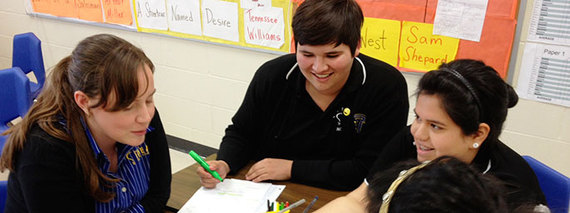By Jennifer Corroy, Guest Blogger
This post was originally published on the TNTP Blog.
Jennifer Corroy began her teaching career as a Teach For America corps member in 2004, and has taught in the Rio Grande Valley of Texas ever since. For the past four years, she has taught high school English at IDEA College Preparatory in Donna, Texas. In 2013, Jennifer was one of four teachers nationwide selected as a winner of TNTP’s Fishman Prize for Superlative Classroom Practice, a highly selective award honoring America’s finest teachers in low-income public schools.
As an English teacher, I spend a lot of time thinking about language. Being a word nerd, after all, is an occupational hazard. But lately, I find myself thinking more and more about how the language we use to describe teachers and teaching has an impact on our profession. How often do we find ourselves using words like “busy,” “stressed,” “tired” and “overworked” to describe teachers? How often do we forget to use words like “professional” and “leader”?
As educators, we often remind ourselves that behavior is communication. I hope there’s no doubt in my students’ minds—based on what they see me do in our class every day—that I love to teach. But what does our collective behavior as a nation tell our students about the profession of teaching? What does our actual language reinforce about it?
Consider how we talk about the decision to leave the classroom. All too often, we use phrases like “step up,” “better opportunity” or “rising up through the ranks,” or we suggest that by stepping out of the classroom, a teacher can have a “broader impact.” In all of these words, we’re implying that the classroom is a place for people who are either incapable of better things or just not interested in advancement.
We know this is not true. I choose to teach. I’m a hard-working, intelligent person who could do other things. But I choose to teach. As simple as it sounds, I can’t overstate the importance of using that exact language when I talk about my career. To me, a move out of the classroom is not a move up. I’m not too smart to be “just a teacher.” I’m not too educated, too creative or too capable of making a broader impact to be “just a teacher.” In fact, it is because I am smart, educated, creative and capable of making a broader impact that I choose to teach. When I talk about my job, I choose my language carefully because I believe that that language matters as much as my decision to stay in the classroom does.
During this time of year when we celebrate Teachers of the Year and winners of teaching awards like the Fishman Prize for Superlative Classroom Practice, we hear a lot of language that amplifies and celebrates great teachers, and that’s fantastic. But we need to use that language throughout the year. We need to consistently choose behaviors that communicate the importance of teachers to our students and to each other, and we need to keep investing in efforts like teacher career pathways, so that teachers have the support and opportunity to move “up” without moving “out.”
We damage our own collective cause—making an excellent education available to all students—when our actions and language teach our kids that if they can, they should do something better than teaching. Instead, we should be encouraging our best and brightest students to consider careers in the classroom, and we should be modeling for them that this is an ambitious, challenging and rewarding choice.
This became especially clear to me when the top-performing student in my class last year was so bewildered by my life choice that she couldn’t help but finally ask directly. “I don’t want to offend you Ms. Corroy,” she said (and we all know where that leads to). “But you’re just so smart. Why aren’t you doing something more than teaching?”
I managed to hold back my tears until later. Instead, I explained that I love teaching, that I love feeling challenged by the work and that teaching is my “something more.”
As we see the growth of prestigious teaching awards and teacher leadership opportunities, we have more and more teachers who are in an important position to exercise and elevate their voices. With this recognition, these teachers are one step closer to the place we know many more teachers should be—where our voices are likely to be sought out and heard in the conversations that affect our students and our profession.
I hope my colleagues will consider it both a privilege and an obligation to reflect, to refine their opinions and voices, and ultimately to speak about the work we love.
Speak up to students about why we choose this work; speak carefully if we choose to leave the classroom; speak bravely when our opinions are sought about school and district decisions; speak generously to encourage colleagues when they struggle and to affirm them when they thrive; and speak confidently, like the experts we are, when it comes to national conversations on education.
Just remember: The kids are listening.
